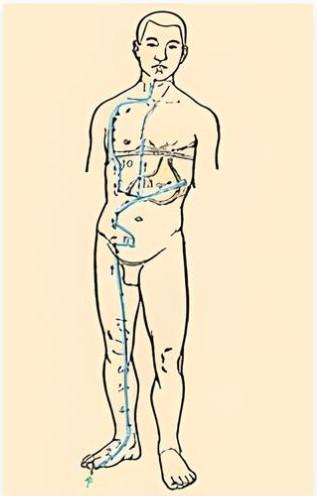The
spleen and stomach are located in the upper abdomen, and are considered the "acquired foundation of life," being the source of
blood and
qi (vital energy) productions. The
stomach is responsible for receiving food and initiating digestion, then the spleen further digests and absorbs the nutrients and fluids, transform them into fundamental substances that will be transported throughout the body. These digestive and distributive processes of the spleen is referred to as “transportation and transformation” in TCM. Besides the “transportation and transformation” of the fundamental substances, the spleen also manages blood flow, oversees the limbs and muscles.The mouth and lips are important areas for observing spleen and stomach related conditions.
The
spleen meridian is communicated with the
stomach meridian, meaning they have an internal-external relationship and can affect each other when one is diseased, often resulting in simultaneous spleen and stomach disorders. Common symptoms of spleen-related issues in TCM include abdominal distention and pain, diarrhea, loose stools, general swelling and bleeding disorders; while stomach-related issues are likely to see poor appetite, stomachache, vomiting, belching, and hiccups.

Below are common disharmonies of the spleen and stomach:
Deficiency in spleen qi
Low appetite, indigestion, abdominal distension after meals, abnormal bowel movements, passing loose stools, fatigue, sallow or pale complexion, limb weakness, skinny or general swelling. On examination, the tongue is pale with a white thin coating, the pulse is slow and thready.
Western Medicine reference: Chronic enteritis and chronic hepatitis.
Sinking of spleen qi
Dizziness, heavy bearing down sensations in gastric and abdominal regions, abdominal distension after meals, frequent urge for defecation, fatigue, breath shortness, general weakness, chronic diarrhea, and a yellow complexion. There may also be prolapse (sinking down) of the anus or other organs (e.g. uterus, stomach or kidney). On examination, the tongue is pale, and the pulse is weak.
Western Medicine reference: Prolapse of anus, uterus or stomach, and malnutrition
Spleen failing to control blood
Pale face without luster, pale white lips and nails, fatigue, general weakness, breath shortness, poor appetite, abdominal distension or diarrhea, excessive menstruation, uterine bleeding, bloody urine, gum bleeding, and purpura (purple bruised spots on the skin). On examination, the tongue is pale, and a thready and weak pulse is present.
Western Medicine reference: Hemorrhoids, bleeding disorders, and tumors.
Spleen deficiency causing edema
General swelling that more obvious in the lower part of the body, distension in gastric and abdominal regions, abdominal pain that feels better by pressing or warming, bland taste in the mouth, poor appetite, loose stools, urinary difficulty, sensitive to cold temperatures, heavy and cold limbs, and possibly clear and thin vaginal discharge. On examination, the tongue is pale with a white and slimy coating, and the pulse is deep and slow.
Western Medicine reference: Chronic nephritis, and chronic gastroenteritis.
Insufficiency of stomach yin
Dry mouth and throat, thirst, hunger without a desire to eat, dry retching and hiccups, stomach-ache or fullness in the gastric area, and dry stools. On examination, the tongue is red and dry with little or no coating, the pulse is thready and rapid.
Western Medicine reference: Chronic gastritis and ulcer diseases.
Cold-damp accumulating spleen
A heavy head, bland taste and sticky feeling in the mouth, nausea, gastric fullness, poor appetite, abdominal distension and pain, diarrhea, sallow complexion, limb weakness, heavy feeling body, scanty urine and loose stools. In serious cases, there may be yellowing of the skin or whites of the eyes, and limb swelling. On examination, the tongue is bulky and tender with a white and greasy coating, the pulse is hesitant and slow.
Western Medicine reference: Gastroenteritis and nephritis.
Damp-heat in spleen and stomach
General weakness, heavy limbs, slimy and sweet taste in the mouth, nausea, poor appetite, aversion to greasy foods, distension and fullness in gastric and abdominal areas, loose bowels, yellow and scanty urine. There may also be bright yellow skin and eyes, itching, or fever that cannot be relieved after sweating. On examination, the tongue is red with a yellow and greasy coating, the pulse is hesitant and rapid.
Western Medicine reference: Hepatitis or jaundice.
Stomach fire blazing
Burning pain in gastric region, thirst that prefers cold drinks, good appetite, feel hungry easily, acid reflux, vomiting or nausea, swollen and painful gums. There may also be ulcers and bleeding on the gums, foul breath, yellow urine and constipation. On examination, the tongue is red and dry with a yellow coating, and the pulse is rolling and rapid.
Western Medicine reference: Ulcer diseases, diabetes, and gum problem.
Retention of food in stomach
Distension or pain in gastric region that feels better after vomiting, foul belching, acid reflux, vomiting undigested food, anorexia, acidic and foul breath, diarrhea or stools containing undigested food. On examination, the tongue coating is thick and greasy, the pulse is rolling.
Western Medicine reference: Acute gastritis
Cold coagulating stomach
Cold and dull pain in gastric region which is aggravated by cold foods or temperatures, while alleviated by warm foods or temperatures, bland taste in mouth, vomiting after meals, excessive saliva, hiccups and abnormal bowel movements. On examination, the tongue is pale with a white slimy coating, the pulse is taut or slow.
Western Medicine reference: Chronic gastritis and ulcer diseases.



